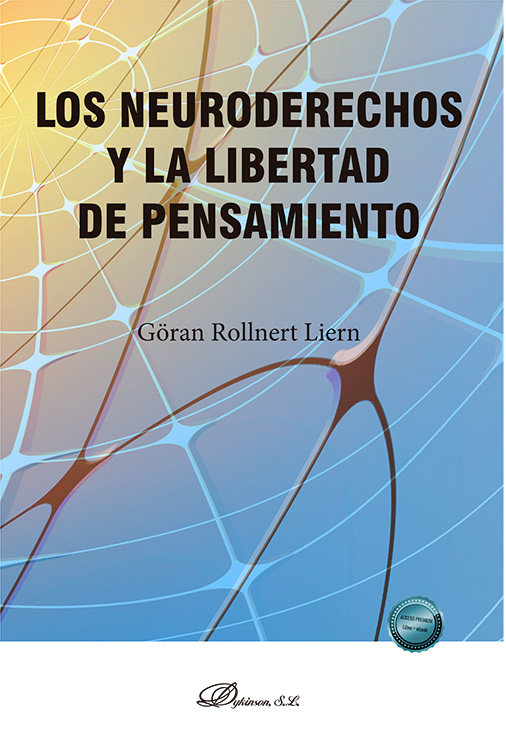Rollnert-Liern's work is a comprehensive study on the legal challenges involved in protecting the mind against the rapid development of neurotechnologies.
The emerging concept of "neuro-rights" is deeply analyzed, examining it from the perspective of freedom of thought as recognized in both international treaties and article 16 of the Spanish Constitution. The analysis starts with the main proposals on neuro-rights, comparing their common elements and differences, and then studies their impact on international regulations, both globally and in Europe.
- Access to the book (Dykinson publisher)
- Author's personal profile and brief curriculum: https://www.uves/persona/goran.rollnert
"Neuro-rights and Freedom of Thought"
The book begins with a general introduction. In the first chapter, "Neuro-rights: The State of the Art", the proposals on neuro-rights (1.1) and their reception in international regulation (1.2) are analyzed. The second chapter deals with freedom of thought, cognitive freedom, and freedom of the mind, starting with a brief characterization of freedom of thought (2.1), followed by an analysis of cognitive freedom as a fundamental right to freedom of thought, highlighting mental autonomy and freedom of the mind (2.2). Next, it addresses the subsumption of freedom of thought into cognitive freedom, referring to mental self-determination, privacy, and integrity (2.3). The adaptive development or evolutionary interpretation of freedom of thought is also discussed (2.4), and a minimalist eclectic view is proposed (2.5).
The third chapter focuses on the state of the art in Spain. It examines the Digital Rights Charter, neuro-rights, and freedom of thought (3.1), as well as freedom of thought as an internal dimension of ideological freedom (3.2). Then, it explores the relationship between freedom of thought, self-determination, and dignity (3.3), the content of an unlimited freedom of thought (3.4), the ideological neutrality of the State (3.5), and the European Convention on Human Rights as an interpretative criterion for freedom of thought (3.6).
The fourth and final chapter presents some conclusions, starting with the current state of neurotechnologies, such as "reading" the brain and "writing" on it (4.1). It also discusses the insufficiency of international human rights legislation and criticisms of this idea (4.2), freedom of thought as freedom of the mind (4.3), and some open questions (4.4). Finally, the book includes a bibliography.
Table of Contents
INTRODUCTION
NEURO-RIGHTS: THE STATE OF THE ART
1.1. The proposals on neuro-rights
1.2. The reception of neuro-rights in international regulation
FREEDOM OF THOUGHT, COGNITIVE FREEDOM, AND FREEDOM OF THE MIND
2.1. Brief characterization of freedom of thought
2.2. Cognitive freedom as a fundamental right to freedom of thought: mental autonomy and freedom of the mind
2.3. Freedom of thought subsumed into cognitive freedom: mental self-determination, privacy, and integrity
2.4. Adaptive development or evolutionary interpretation of freedom of thought< /p>
2.5. A minimalist eclectic proposal
THE STATE OF THE ART IN SPAIN
3.1. The Digital Rights Charter, neuro-rights, and freedom of thought
3.2. Freedom of thought as an internal dimension of ideological freedom
3.3. Freedom of thought, self-determination, and dignity
3.4. The content of an unlimited freedom of thought
3.5. The ideological neutrality of the State
3.6. The European Convention on Human Rights as an interpretative criterion for freedom of thought
SOME CONCLUSIONS
4.1. The state of neurotechnologies: "reading" the brain and "writing" on it
4.2. The insufficiency of international human rights legislation and criticisms of this premise
4.3. Freedom of thought as freedom of the mind
4.4. Open questions
BIBLIOGRAPHY
About the author

Dr. Göran Rollnert-Liern is a member of the Neuro-law research group at UV as a collaborator. He has published several prominent works in the field of neuro-law, analyzing the rights related to the use of neurotechnologies and the protection of freedom of thought, and has been involved in research projects on the sources of law and fundamental rights, with a special focus on educational innovation in this area. He has also received several awards for his teaching excellence and has participated as an external reviewer for academic journals in the field of constitutional law.





